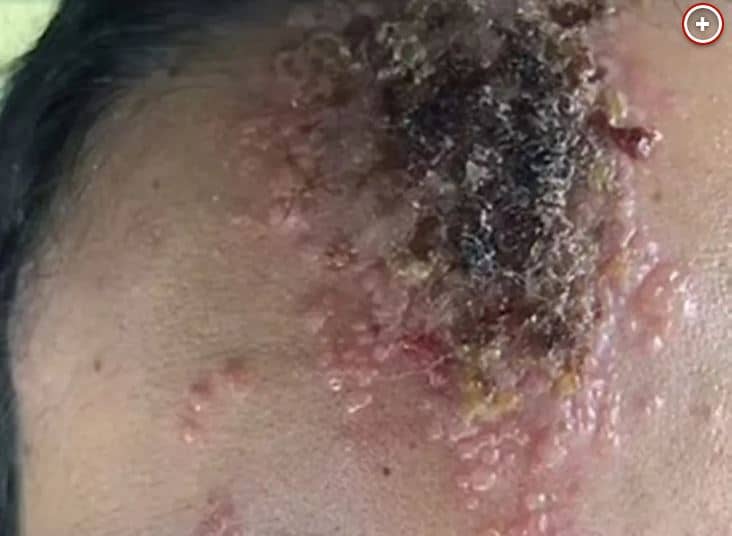
For this fan, the memory of attending the Falls music festival in Australia will stick with her for life — unfortunately.
Taneesha Crowe, 23, warned her followers on TikTok about the perils of concertgoing after she contracted herpes on her forehead at the Melbourne event, according to a report.
“So five years ago I finished school and I went to Falls, and when I got home I was so sick,” Crowe shared on the social media app in a recent post, which was deleted shortly after her story went viral.
Crowe, who was 18 years old at the time of the infection, went on to develop a “massive painful scab” — that soon left her unable to eat or drink, landing her in the hospital for five days.
“I couldn’t keep any food down, I couldn’t keep any water down. I couldn’t sleep because I was having cold sweats,” she said.
Doctors initially believed the mark on her head was a simple sunburn — until her condition worsened, with fever and an evolving rash that eventually turned black, resembling a scab.
“I remember going to the pharmacist and she was like, ‘Oh my God, are you OK? Did you fall over?’ I was so embarrassed,” she continued, according to a report.
Determined to get rid of the growing scab, she got tested for staphylococcus infection and the shingles virus, which both returned negative.
One follow-up with Crowe’s doctors prompted them to rush her to a hospital after seeing how drastically the rash had worsened.
After five days of testing, Crowe was diagnosed with herpes, which is caused by the herpes simplex virus.
“Basically it was a huge cold sore on my face,” said Crowe.
There are two types of HSV: HSV1, oral herpes, and HSV2, genital herpes.
Type 1 is usually spread through oral contact, and manifests most commonly in and around the mouth, which we often call cold sores. Type 2 is typically sexually transmitted, causing genital and anal sores — though HSV1 can also cause sores down there.
The Melbourne woman still doesn’t know how she contracted the disease. Her doctors posited that she may have brushed against someone with an infected sore in the crowd.
Crowe’s biggest concern after her diagnosis was if she would be left with a huge scar. “It did take a lot of time [to heal], but there’s not really any noticeable scarring left,” she said.
Currently, there is no cure for herpes. However, there are ways to treat the virus and subdue outbreaks, with both oral and topical therapies.
It’s been estimated that some 50% to 80% of people in the US carry the oral herpes virus, though it may never rear its ugly head: Many people with herpes don’t show symptoms, and won’t know they have it unless an outbreak occurs. It’s not yet clear why herpes presents symptomatically in some and not others, though researchers speculate it stems from dysfunction in the immune system.

HSV2 is somewhat less common, found in approximately 12% of the sexually active, adult population. However, the Centers for Disease Control and Prevention believe that many more may be developing genital sores that stem from HSV1 as a result of oral sex.
This may very well have been Crowe’s initiation into the vast, global herpes club — as the initial infection and outbreak (known as primary herpes) likely prompted Crowe’s flu-like symptoms, such as body aches, fever and headache, alongside the rash.
Advertise with the mоѕt vіѕіtеd nеwѕ ѕіtе іn Antigua!
We offer fully customizable and flexible digital marketing packages.
Contact us at [email protected]

















Y’all don’t have nothing to report. SMH
@Rudegyal shut the f*ck up b*tch, this was very insightful!!
You must stop ride people man bareback and suck d*ck 🤣
John public 🤣🤣🤣🤣
John public 🤣🤣🤣🤣
Comments are closed.